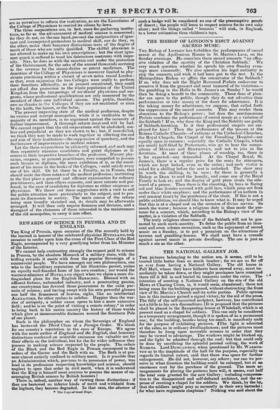THE BISHOP OF LONDON'S EDICT AGAINST SACRED MUSIC.
THE Bishop of LONDON has forbidden the performances of sacred music at the Apollonicon Rooms in St. Martin's Lane, on the Sunday evenings. He considers these sacred concerts "an offen- sive violation of the sanctity of the Christian Sabbath." We very much question whether he spends his own Sunday even- ings more innocently. We also question his legal authority to- stop the concerts, and wish it had been put to the test. Is the Metropolitan Bishop ex officio the conservator of the Sabbath?. If so, why does not the Right Reverend Prelate endeavour to preserve it from the grossest and most immoral of its violations— the gambling in the Hells in St. James's on Sunday ? he would then be doing a benefit to the community. These dens of plun- der are open to the public, though they do not advertise their performances or take money at the doors for admittance. It is the taking money for admittance, we suppose, that called forth the suppression of the sacred concerts. This may render them obnoxious to the Bishop's power ; but does the sanctimonious Prelate condemn the performance of sacred music as a violation of the Sabbath ? If so, why then the King and the Nobility are guilty of Sabbath-breaking. Is it that professional singers are em- ployed for hire? Then the performance of the masses at the Roman Catholic Chapels—of anthems at the Cathedral Churches, the Royal Chapels, the Chapel of the Foundling Hospital—are equally open to censure; especially the Catholic Chapels, which are nearly half-filled by Protestants, who go to hear the compo- sitions of MOZART and BEETHOVEN, and not to join in the devotions. At most of these places of worship, too, there is a fee expected—nay demanded. At the Chapel Royal, St. James's, there is a regular price for the seats for strangers, which are kept locked, even in the aisles; and each visitor is asked for a shilling before the seat is unlocked. The show may be worth the shilling, to be sure; for there is generally a Bishop or Dean to read the homily, and some one of the Royal Family to look at; and the display of gold plate rivals the side- board of a prince. Then there is the chanting, by boys in flaring red and blue liveries covered with gold lace, which peep out from under their white surplices; and the performance of an anthem (a real musical treat) by the gentlemen of the choir. If this is not a public exhibition, we should like to know what is. It may be urged that this is at a chapel and on the occasion of divine service. So much the worse; because a religious duty is thus made the pre- tence for a concert, which, according to the Bishop's view of the matter, is a violation of the Sabbath.
The truly religious observance of the Sabbath will not be pro- moted by such mock-sanctity. To debar the public from an inno- cent and even solemn recreation, such as the enjoyment of sacred music on a Sunday, is to put a premium on the attractions or taverns and gambling-houses. We shall next have a crusade against sacred music in private dwellings. The one is just as. much a sin as the other.


















 Previous page
Previous page